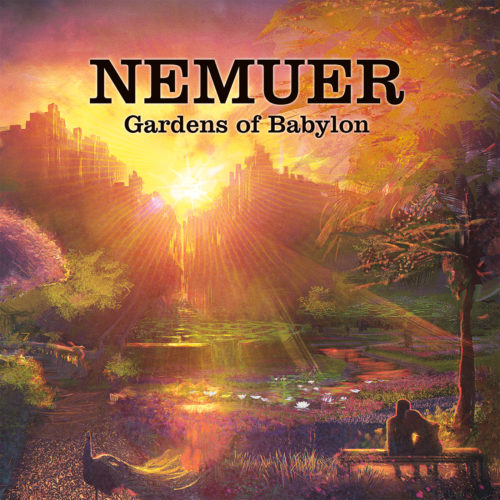TWH — On the song “Descent to the Realm of the Dead” by the duo Nemuer, singer-guitarist Michael Zann chants and growls, “Ušellâ mītūti ikkalū balṭūti,” but only a handful of scholars in the entire world will know, without looking at the liner notes of the band’s new album Gardens of Babylon, that Zann is singing, “I will raise up the dead so that they devour the living.”
That’s because the Czech-born Zann isn’t singing in his native tongue, some other Slavic language or Klingon. Rather, he’s singing in Akkadian, the extinct language that was all the rage in Mesopotamia from 3000 B.C.E. to 1000 B.C.E.
Evocations of flesh-eating, netherworld denizens aside, Nemuer (pronounced Ne-moo-er) isn’t some black metal band. Instead, Zann and his mate Katarina Pomorska call themselves “an atmospheric dark folk duo.” Their bio proclaims that “in order to keep the atmosphere utterly immersive, they use solely authentic dead languages or lyric-less primordial chanting.”
Zann’s co-writer for “Descent to the Realm of the Dead” was some anonymous, ancient Babylonian scribe who carved the tale of the goddess Ishtar and her descent to the netherworld onto a clay tablet some three millennia ago.

That song and the rest of Gardens of Babylon are certainly atmospheric and dark, but it’s the darkness of shadows and sorrow, of dread and the Dark Side of the Moon rather than something overtly sinister or evil – even if the band did use the term “Lovecraftian atmosphere” to describe some of their earlier work.
Cross-breed the sound textures of that Pink Floyd classic with the mythopoeic world music ensemble Dead Can Dance, then mix in the story of how Ishtar, the ancient Mesopotamian goddess of love, sex, fertility and war, ventured into the netherworld, and you have an idea of Gardens of Babylon.
As for that earlier statement that only a handful of scholars will know what Zann and Pomorska are chant-singing without looking at the liner notes — maybe listeners will know intuitively. Such is the haunting power of the dream-like, trance-inducing soundscapes that Nemuer conjures on its third album.
Along with his acoustic guitar work, Zann plays jaw harp, “shaman (frame) drum,” and djembe, and contributes vocals that he describes as “tribal, throat singing, and overtones.” Pomorska sings and plays djembe, shaman drum and duclar (a reed wind instrument).

Katarina Pomorska, left, and Michael Zann of Nemuer [Jeroen Rood.]
Pomorska provides counterpoint with vocals that meander between a wail and a gentle siren’s call, and sometimes it’s her duclar that shape-shifts a song.
How does Zann know what the Akkadian language sounds like, given that the last person to speak it in daily life left this planet centuries ago? Turns out that scholars of ancient languages have been able to reconstruct some of the dead ones, and now the Internet is peppered with recordings of modern-day, scholarly folks reciting “Ishtar’s Descent to the Netherworld,” “The Epic of Gilgamesh” and “The Babylonian Poem of the Righteous Sufferer” in Akkadian. (A snippet of the latter piece also appears on Nemuer’s latest album.)
Here’s more of the English translation of the Ishtar myth that Zann sings in Akkadian on “Descent to the Realm of the Dead”: “Open your gate, open your gate, that I may enter to the gloomy house, the seat of the netherworld, to the road whose journey has no return. Open your gate, open your gate, that I may enter! I will raise up the dead so that they devour the living . . . .”
By the way, Zann and Pomorska say they are fascinated not only by Babylonian myth, but also by Egyptian, Mayan, and Norse mythology.
Zann says that Nemuer “has never been about music only.” The duo seeks to “create a hypnotic, transcendent experience that combines art with ancient mysticism.”
One might be tempted to say that Gardens of Babylon would make for an engaging soundtrack for Pagan ritual. But the album’s dreamy, shape-shifting sonic alchemy makes listening to it a ritual-like experience in itself.
The ghost of that anonymous, ancient Babylonian bard is smiling. The goddess Ishtar is smiling, too.
The Wild Hunt is not responsible for links to external content.
To join a conversation on this post:
Visit our The Wild Hunt subreddit! Point your favorite browser to https://www.reddit.com/r/The_Wild_Hunt_News/, then click “JOIN”. Make sure to click the bell, too, to be notified of new articles posted to our subreddit.